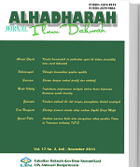Dinamika Komunikasi Politik Pada Pemilihan Presiden Di Indonesia
DOI:
https://doi.org/10.18592/alhadharah.v18i2.3379Keywords:
political communication, electoral, digital mediaAbstract
The dynamics of political communication have occurred through phenomena before and after the presidential election in Indonesia, both conducted by political elites, party supporters, and the public to win the presidential candidates and vice-presidential candidates he supports. This can be seen from the form of political communication in the campaign, political attitudes in addressing the vote acquisition, and post-election political communication. Political communication through campaigns using digital media especially social media such as Twitter, Whatsapp, Facebook, Instagram, and other media has given a very significant influence in gaining public support, but negative campaigns and black campaigns (hoax) cannot be avoided, even to the legal sphere. Political communication at the end of the voting is stated through a victory speech through political speeches based on different survey results, namely quick count and exit poll. The speech added to the polemic about the validity and honesty in the implementation of the General Election because of the very significant difference in votes in Indonesia. Political communication on the determination of the results of the real count resulted in an unelected presidential candidate bringing the case to the realm of law namely the Constitutional Court court to cancel the victory of the elected presidential candidate. Political communication after the determination of the results of the elected election is that the elected president reconciles the non-elected presidential candidates to eliminate friction in the community. Besides, the coalition party supporting the elected president lobbied both fellow supporters and the elected president to get a ministerial position in the cabinet and the parliament.References
Andi.Link. Hootsuite (We are Social): Indonesian Digital Report 2019. Diakses pada Juli 20, 2018, dari https://andi.link/hootsuite-we-are-social-indonesian-digital-report-2019/.
Cole J. Harvey & Paula Mukherjee. (2018). Methods of Election Manipulation and the Likelihood of Post-Election Protest. Government and Opposition (2018), 0, 1–23. doi:10.1017/gov.2018.38.
Dominic Wring, Roger Mortimore, Simon Atkinson. (2019). Political Communication in Britain: Campaigning, Media and Polling in the 2017 General Election. Switzerland: Palgrave Macmillan.
Kominfo. Pemilu 2019 dalam Pusaran Hoaks, Bukti Lemahnya Literasi Digital?. Diakses pada Juli 20, 2018, dari https://www.kominfo.go.id/content/detail/18231/pemilu-2019-dalam-pusaran-hoaks-bukti-lemahnya-literasi-digital/0/sorotan_media.
Kompas. Ini Alasan MK Baru Perbolehkan Publikasi "Quick Count" Pukul 15.00 WIB. Diakses pada Juli 20, 2018, dari https://nasional.kompas.com/read/2019/04/16/13105091/ini-alasan-mk-baru-perbolehkan-publikasi-quick-count-pukul-1500-wib.
Lynda Lee Kaid. (2004). Handbook Of Political Communication Research. London: Lawrence Erlbaum Associates.
Republika. Pidato Kemenangan, Jokowi: Mari Hargai Hasil Pemilu. Diakses pada Juli 20, 2018, dari https://nasional.republika.co.id/berita/nasional/politik/pruevm409/pidato-kemenangan-jokowi-mari-hargai-hasil-pemilu.
Richard M. Perloff. (2014). The Dynamics Of Political Communication: Media and Politics in a Digital Age. New York: Routledge, Taylor & Francis Group.
Robert Huckfeldt & John Sprague. (1995). Citizens, Politics, And Social Communication: Information And Influence In An Election Campaign. Australia: Cambridge University Press.
Ruxandra Boicu, Silvia Branea, Adriana Stefanel. (2017). Political Communication and European Parliamentary Elections in Times of Crisis: Perspectives from Central and South-Eastern Europe. United Kingdom: Palgrave Macmillan.
Shoko Kiyohara, Kazuhiro Maeshima, Diana Owen. (2018). Internet Election Campaigns in the United States, Japan, South Korea, and Taiwan. Switzerland: Palgrave Macmillan.
Downloads
Published
How to Cite
Issue
Section
License
Authors retain copyright and grant the journal the right of first publication, with the work simultaneously licensed under the Creative Commons Attribution-NonCommercial 4.0 International Public License (CC BY-NC 4.0). This license allows reusers to distribute, remix, adapt, and build upon the material in any medium or format for noncommercial purposes only, provided that proper attribution is given to the original creator.







